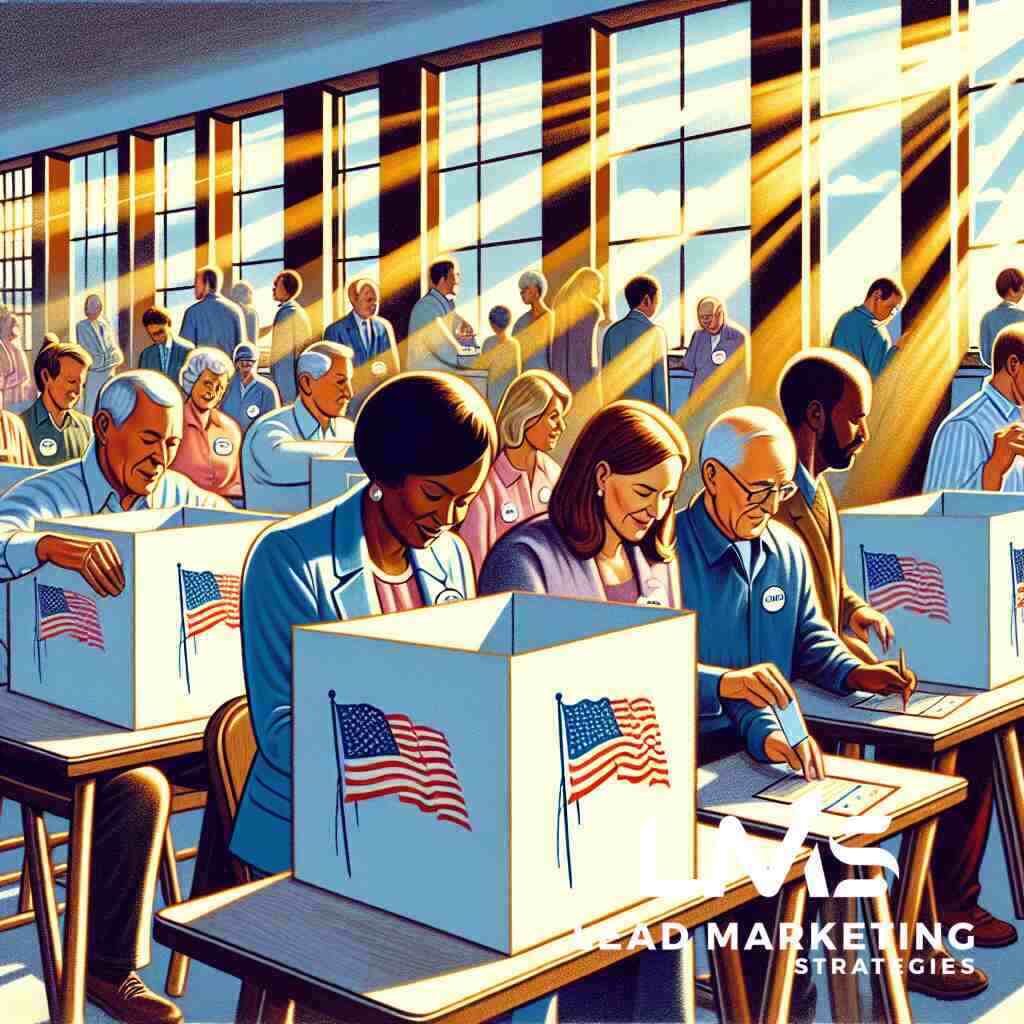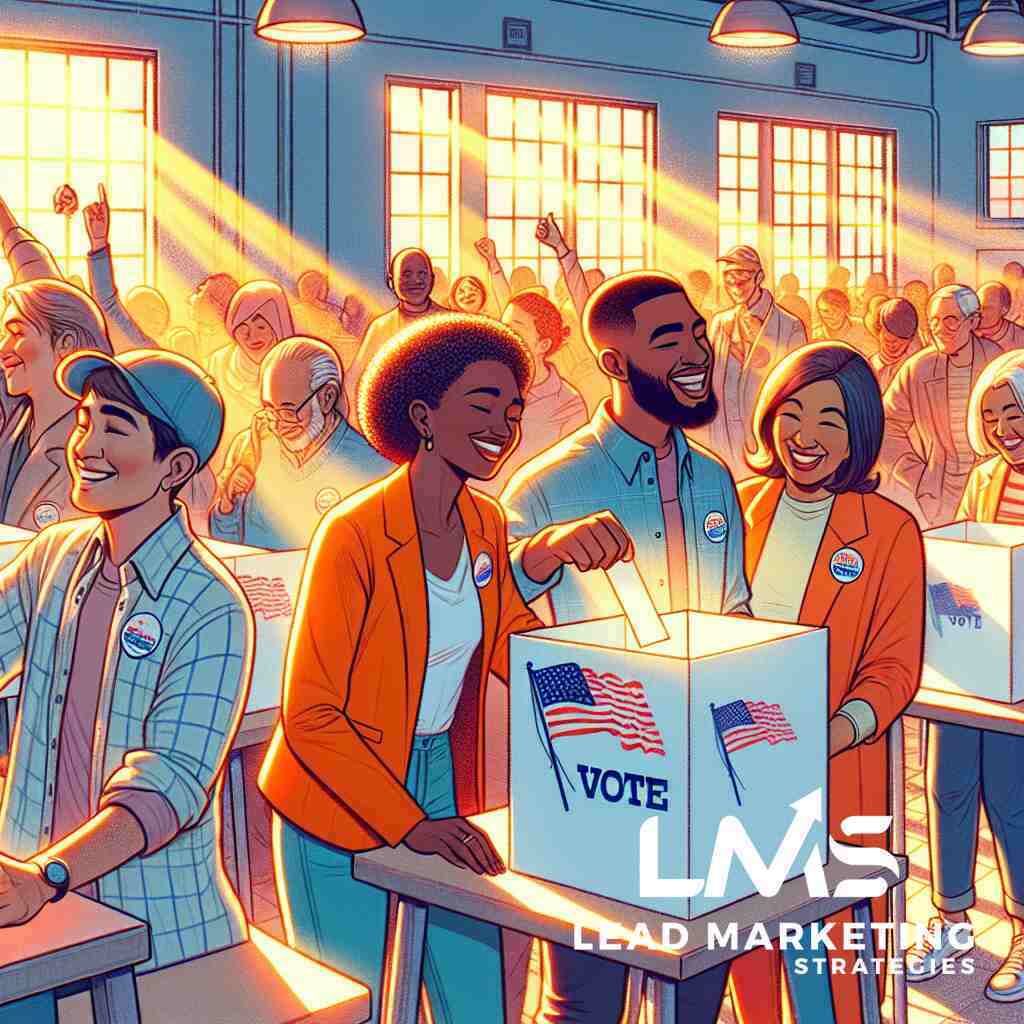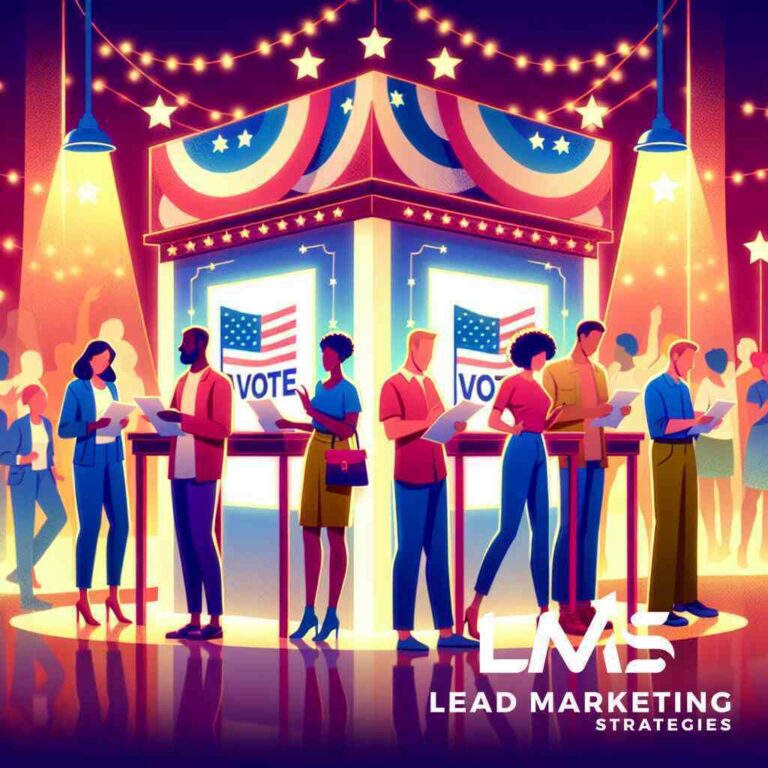Reimagining Voter Engagement for a Digital Era
Embracing AI and Machine Learning for Voter Insights
In political marketing, leveraging AI and machine learning provides unprecedented opportunities for gaining voter insights. These technologies enable political campaigns to analyze vast amounts of data to identify patterns and trends in voter behavior. With AI-driven political marketing, campaigns can tailor strategies that speak directly to the voters’ needs and expectations. Adopting these advanced technologies translates into an enhanced understanding of electoral dynamics and allows for precision targeting. Furthermore, by embracing AI, campaigns can predict future voter behavior, making electoral strategies more effective and nuanced.
Harnessing the Power of Mobile Voter Engagement Apps
The increase in smartphone usage has opened new avenues for voter engagement through mobile apps. Mobile voter engagement apps are revolutionizing how campaigns interact with constituents, offering real-time updates, personalized messaging, and interactive features. These tools grant voters immediate access to campaign information, fostering a more connected and informed electorate. Campaigns can now establish a direct line of communication with voters, ensuring that messages are not only received but also acted upon. With the convenience and personalization that mobile apps offer, political campaigns can significantly boost voter participation and engagement.
Leveraging Augmented Reality for Immersive Campaign Experiences
The incorporation of augmented reality in political campaigns is reshaping how constituents experience political messaging. Through augmented reality, campaigns can create engaging and immersive experiences that bring political issues and messages to life in compelling ways. Such interactive voter engagement platforms allow voters to visualize policies and issues, fostering a deeper understanding and emotional connection to the campaign. This innovative approach not only captivates but also educates voters, enhancing campaign efficacy. As augmented reality technology continues to evolve, it offers a dynamic platform for creating memorable and impactful voter interactions.
Strategic Implementation of Data-Driven Electoral Campaigns
Utilizing Predictive Modeling for Accurate Voter Behavior Analysis
In the fast-paced world of electoral dynamics, understanding voter behavior is crucial to driving successful campaigns. Predictive modeling has emerged as a game-changing strategy that allows campaigns to analyze past voting patterns and predict future behavior. By leveraging predictive voter behavior models, campaigns can fine-tune their strategies to align with voter expectations and preferences. This forward-thinking approach enables political teams to allocate resources effectively, target specific voter demographics, and optimize campaign messaging. Embracing predictive modeling not only enhances campaign efficiency but also fosters a deeper connection with the electorate by anticipating their needs and concerns.
Micro-Targeting and the Role of Personalization in Political Outreach
As political campaigns strive to resonate more intimately with voters, personalization has become paramount. Micro-targeting strategies enable campaigns to create customized messages that appeal to individual voters’ interests and values. This nuanced approach allows for political outreach micro-targeting, where campaigns use data analysis to identify specific voter segments and tailor their communication accordingly. By understanding the unique priorities of diverse voter groups, campaigns can craft messages that build trust and drive engagement. Personalized outreach not only increases the efficiency of campaign efforts but also enhances voter satisfaction, resulting in higher levels of voter turnout and support.
Blockchain for Enhanced Voter Security and Trust
In an age where data security is of utmost concern, blockchain technology offers a solution for enhancing voter security and trust. The implementation of secure voting with blockchain ensures that electoral processes are transparent, tamper-proof, and reliable. By employing this technology, campaigns can guarantee voters that their personal information is safeguarded, mitigating concerns over data breaches and electoral fraud. Blockchain’s decentralized nature provides an auditable trail of transactions, fostering trust in the integrity of the electoral system. As political campaigns continue to explore innovative technologies, blockchain stands out as a pivotal tool in strengthening electoral credibility and ensuring voter confidence in the democratic process.
Crafting Emotionally Resilient Campaign Narratives
Integrating Sentiment Analysis for Adaptive Messaging
In today’s digital landscape, integrating sentiment analysis into electoral campaigns allows for precision in adopting adaptive political messaging. Utilizing advanced data analytics, campaigns can assess voter sentiment across various platforms, identifying shifts in public opinion in real time. By monitoring how voters react to different messages, political teams can dynamically adjust their narrative to resonate with the electorate. This real-time adaptability ensures that messaging not only meets voter expectations but also aligns with evolving social and political climates. Employing sentiment analysis aids in crafting emotionally engaging political campaigns by providing insights that drive empathetic communication and enhance voter connections.
Omni-Channel Communication for Consistent Voter Engagement
The imperative for cross-platform voter communication is clearer than ever as political campaigns strive to maintain consistent engagement with constituents. By employing omnichannelcommunication strategies, campaigns can deliver coherent and unified messages across diverse media outlets. This approach ensures that voters receive a seamless experience, whether they engage through social media, email, or traditional media. Consistent messaging fosters trust and reinforces campaign narratives, creating a stable bridge between candidates and voters. By harmonizing messages across channels, campaigns achieve a synchronized outreach that maximizes voter engagement and solidifies the campaign’s presence in the public sphere.
Fostering Emotional Resonance Through Influencer Engagement
Influencer marketing has emerged as a powerful strategy in political advertising, leveraging the reach and credibility of popular figures to foster emotional resonance with voters. Engaging with influencers who align with campaign values enables political teams to amplify their messaging through trusted voices. This strategy not only broadens the campaign’s reach but also enhances credibility and relatability. By fostering partnerships with key influencers, campaigns can tap into niche audiences and convey messages that resonate more personally with specific voter segments. Such influencer-driven campaigns harness the power of social proof, driving voter engagement and trust in an increasingly crowded media landscape.
Revolutionizing Voter Interaction Through Unique Platforms
Exploring the Future of Digital Town Halls and Virtual Canvassing
Digital town halls and virtual canvassing are transforming the way political campaigns engage with the electorate, providing innovative voter engagement strategies 20for 25. By creating virtual spaces for dialogue, candidates can interact with voters without the constraints of physical boundaries. These platforms enable real-time discussions, personalized feedback, and a level of accessibility previously unattainable through traditional means. Voters from various demographics can now participate in meaningful exchanges, fostering a more inclusive political process. Furthermore, digital town halls offer campaigns the ability to field questions and address concerns promptly, thereby enhancing transparency and building trust among constituents.
Virtual canvassing, another revolutionary approach, employs digital tools to reach voters with targeted messages. This method streamlines the voter outreach process, ensuring campaigns can connect with more voters in a shorter amount of time. The flexibility of digital platforms allows for the integration of multimedia elements to enhance communication. As digital town halls and virtual canvassing continue to evolve, they will play a crucial role in shaping the future of political campaigning.
Gamification: Engaging Voters Through Interactive Experiences
The application of gamification in political campaigns introduces a novel way to captivate and engage voters. By integrating game-like elements into the voter engagement process, campaigns can transform otherwise mundane activities into exciting and participatory experiences. Techniques such as rewarding badges for participation, creating leaderboards, and offering incentives for voter registration are effective in attracting attention and motivating action.
These interactive experiences boost voter interest and commitment, especially among younger demographics accustomed to digital engagement. Gamification strategies tap into the competitive and collaborative instincts of voters, encouraging them to interact more deeply with campaign content. As campaigns embrace this method, they can expect increased voter engagement and a more dynamic interaction with the electorate. Through innovative gamifying voter experiences, political campaigns can redefine the traditional boundaries of political communication.
Experiential Marketing: Innovative Experiments in Civic Engagement
Experiential marketing is gaining traction as a powerful strategy for raising voter awareness and involvement. By creating memorable, hands-on experiences, campaigns can foster deeper emotional connections with voters. These experiences go beyond the digital realm, incorporating live events, immersive exhibitions, and interactive activities that bring political messages to life.
One key benefit of experiential marketing is its ability to humanize candidates, allowing them to present their policies and ideals in a tangible and relatable manner. By engaging directly with the community, campaigns demonstrate their commitment to addressing the needs and aspirations of their constituents. This approach enhances voter trust and encourages community involvement in the electoral process.
Through experiential political marketing, campaigns can run innovative experiments that not only captivate and inform but also inspire civic engagement and participation. By breaking traditional molds and embracing innovative strategies, campaigns can create meaningful interactions that resonate with voters and elevate the democratic experience.
Futuristic Political Campaign Strategies
Harnessing Civic Engagement Technology for Better Outreach
The rapid advancement of technology provides political campaigns with the tools to excel in voter outreach. Harnessing civic engagement technology can revolutionize how campaigns interact with the electorate, fostering deeper connections and more effective communication. By integrating digital campaign tools for elections, political teams can leverage data to personalize engagement efforts and address specific community needs. These tools enable campaigns to seamlessly integrate social media, emails, and mobile communication channels, ensuring that outreach efforts are both comprehensive and responsive. As the landscape of political marketing evolves, campaigns that adapt these marketing innovations are likely to see enhanced voter engagement and support.
Adopting Cross-Platform Political Outreach for Maximized Impact
In an era of digital connectivity, employing a cross-platform approach is vital for maximizing the impact of political outreach. This strategy involves a harmonized integration across various media channels to deliver consistent and engaging content. By adopting cross-platform political outreach, campaigns can ensure that their message resonates with voters across multiple touchpoints, from social media to traditional media outlets. Seamless integration allows campaigns to engage with diverse demographics and amplify their message through shared narratives, crafting a holistic voter experience. This comprehensive approach not only bolsters visibility but also builds trust and fosters a robust voter-candidate connection.
Innovative Use of Location-Based Strategies for Effective Targeting
Location-based strategies offer campaigns a unique advantage in targeting voters with precision and relevance. By utilizing geolocation data, political teams can craft location-based campaign strategies that hone in on regional issues and voter preferences. This tailored approach enables campaigns to personalize their outreach by addressing the specific concerns of different communities. With the ability to deploy adaptive political messaging based on location, campaigns can enhance their relevance and impact, ultimately improving voter engagement and turnout. As campaigns continue to explore innovative strategies, the strategic application of location-based targeting stands out as a critical component in achieving electoral success.
Conclusion: Crafting a Visionary Path Forward
Reflecting on the Evolution of Political Marketing
As we look back on the evolution of political marketing, it’s clear that innovative strategies have reshaped the landscape of political campaigns. From traditional approaches to data-driven techniques, political marketing has undergone significant changes to adapt to modern challenges. The rise of digital tools and platforms has paved the way for more targeted and efficient voter engagement methods. Political Marketing Strategies has been at the forefront of these transformations, offering political marketing solutions that cater to the dynamic needs of today’s electoral environment. By understanding past trends, we can better anticipate future challenges and opportunities, ensuring that political campaigns remain relevant and impactful.
Strategic Imperatives for the Future of Voter Engagement
To thrive in the rapidly evolving political landscape, campaigns must prioritize strategic imperatives that foster effective voter engagement. Embracing adaptive political messaging is essential in aligning campaign narratives with voter emotions and expectations. Crafting messages that resonate on a personal level not only strengthens connections but also enhances trust and loyalty. Moreover, campaigns should leverage digital platforms to widen their reach, employing tools tailored for interactive voter experiencesCampaigns must adaptpt strategies that focus on personalization and relevance, ensuring messages don’t merely reach the electorate but also move them. Political Marketing Strategies stands as a guide for politicians striving to implement these cutting-edge tactics in their campaigns.
Elevating Democratic Participation Through Technology
Technology plays a pivotal role in enhancing democratic participation by providing platforms that simplify voter engagement. Tools such as AI-driven analysis and digital campaign tools for elections enable campaigns to engage voters more effectively and sustainably. These innovations ensure that campaigns can quickly adapt to changing voter dynamics and preferences, enhancing participation and fostering long-term voter relationships. As campaigns continue to evolve, it’s imperative to harness technology that democratizes information, making it accessible and engaging for all demographics. Political Marketing Strategies is dedicated to helping campaigns leverage these technological advancements to not only achieve electoral success but also enrich the democratic process.
Frequently Asked Questions
Question: How can Political Marketing Strategies enhance voter engagement using AI in political marketing, as discussed in the blog Exploring Innovative Voter Engagement Tactics for 2025?
Answer: Political Marketing Strategies excels in utilizing AI in political marketing to revolutionize how campaigns interact with voters. By using AI-driven political marketing solutions, we analyze vast amounts of voter data to identify precise patterns and preferences. This allows us to craft personalized voter outreach strategies that resonate deeply with the electorate. Our advanced analytics enable campaigns to predict voter behavior and adapt messaging in real time, enhancing voter engagement and trust in the electoral process.
Question: What role does gamification for voters play in your approach, and how can it benefit political campaigns?
Answer: Gamification for voters is a cutting-edge approach we employ to make political engagement more dynamic and participatory. By integrating game-like elements such as badges, leaderboards, and incentives, we transform routine political interactions into exciting experiences. This strategy increases voter engagement and is particularly effective with younger demographics who are familiar with digital engagement. How to Engage Gen Z with Political Messaging Today. By using gamification, campaigns can boost voter interest and political participation, giving them a competitive edge.
Question: How do mobile voter engagement apps developed by Political Marketing Strategies support digital campaigning tools?
Answer: Our mobile voter engagement apps are essential digital campaigning tools designed to revolutionize how campaigns communicate with voters. These apps provide real-time updates, personalized messaging, and interactive features, allowing voters to stay informed and connected. Through these apps, campaigns can send targeted messages and facilitate direct communication, significantly boosting voter participation and engagement. The convenience and customization offered by our apps ensure that voters receive timely and relevant information, encouraging higher voter turnout.
Question: Can you explain how experiential political marketing can create immersive voting experiences?
Answer: Experiential political marketing is an innovative approach where we create engaging, hands-on experiences that connect voters emotionally and intellectually. By organizing live events, interactive exhibitions, and immersive activities, we bring political messages to life, making them tangible and relatable. This method humanizes candidates and underscores their commitment to voter concerns, fostering deeper emotional resonance and trust. Such immersive voting experiences are crucial in motivating civic engagement and elevating democratic participation.
Question: What benefits do digital town halls and virtual canvassing methods provide for modern political campaigns?
Answer: Digital town halls and virtual canvassing methods are revolutionary strategies for modern political campaign. They provideg platforms for direct voter interaction without physical constraints. These methods allow for real-time dialogue, immediate feedback, and increased accessibility for diverse demographics. By utilizing virtual spaces, campaigns ensure a more inclusive political process, addressing voter concerns promptly and enhancing transparency. These strategies broaden outreach potential and foster trust and engagement among voters, thereby forming a more informed and connected electorate.





